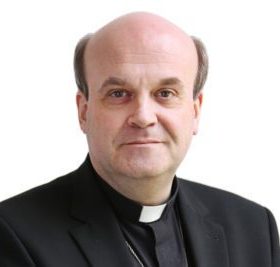One of the first things that Pope Francis asked of the bishops he has called to Rome to take part in the meeting on the protection of minors in the Church, which opens today, was that they meet with victims. This is something that victims themselves had also generally demanded, as a part of the recognition of their suffering: that the Church see them, hear them, understand what they had gone through. In the Netherlands, the Dutch bishops have made efforts to do so since the crisis broke here some nine years ago.
 Bishop Hans van den Hende, chairman of the Dutch Bishops’ Conference and as such a participant in the meeting, decribes the context of his meetings with victims as follows:
Bishop Hans van den Hende, chairman of the Dutch Bishops’ Conference and as such a participant in the meeting, decribes the context of his meetings with victims as follows:
“Several times I have met and spoken with victims of sexual abuse. Sometimes they were people who did not want a procedure, but who did want to tell their story. Most often the meetings were a part of the sessions of the complaints commissions of the reporting authority. Also in the framework of the socalled contact group, there has in some cases been direct contact with victims, because their procedures had stagnated. These meetings were a confrontation every single time. As a bishop you act on behalf of the community of the Church. Often the accused had already passed away. Many people have been marked by the abuse and I could see that speaking about the personally suffered abuse is difficult and requires courage.”
Bishop van den Hende sees the meeting as a unique event, the first in its kind, and forms his expectation around the goals expressed by Pope Francis:
“The pain and shame for the abuse of minors has been felt for years inside and outside the Church. This is the first time that the problem of abuse of minors in the Church is discussed in a special meeting of the worldwide Church. Pope Francis has indicated that he has three things in mind with this meeting: to make bishops across the world aware of the abuse and make them recognise it, commitment of the worldwide episcopate to engage this problem, plus communal moments of prayer and penance.”
The Dutch approach has always had a sharing with the rest of society in mind. This was a recommendation of the Deetman Commission, which executed the independent investigation into abuse in the Catholic Church in the Netherlands. As part of this effort, the Commission’s final report was translated into English and communicated to the Congregation for the Doctrine of the Faith. The Dutch experience, Bishop van den Hende explains, is in a sense unique and may well be a valuable contribution to the meeting:
“In the Netherlands the bishops and religious are fully aware of the seriousness of the abuse of minors by people of the Church. Together they chose at the time for an independent investigation and an independent procedure to achieve recognition and compensation for victims, and also support. Elsewhere in the world you do not often see such cooperation or joint approach.”